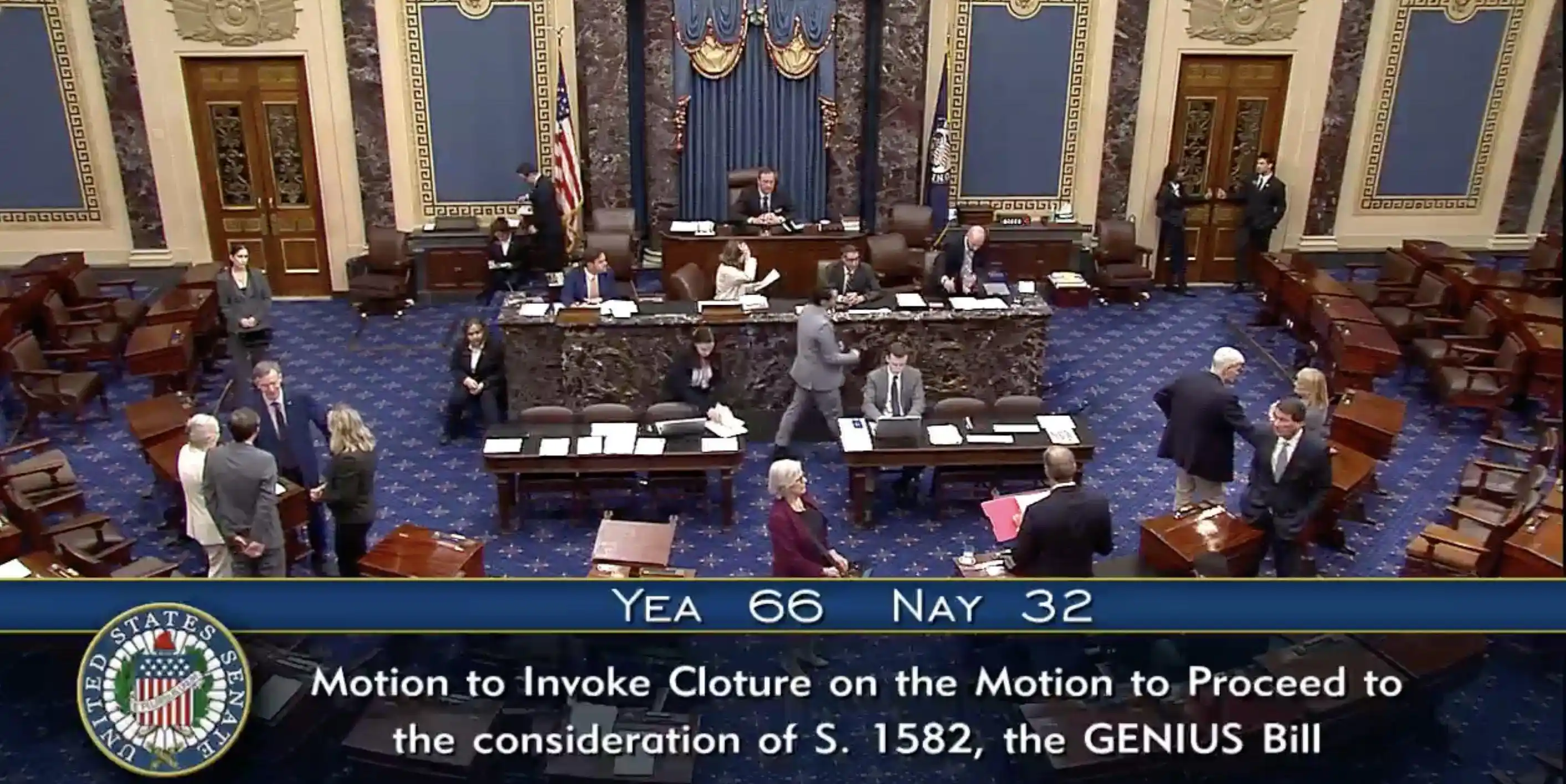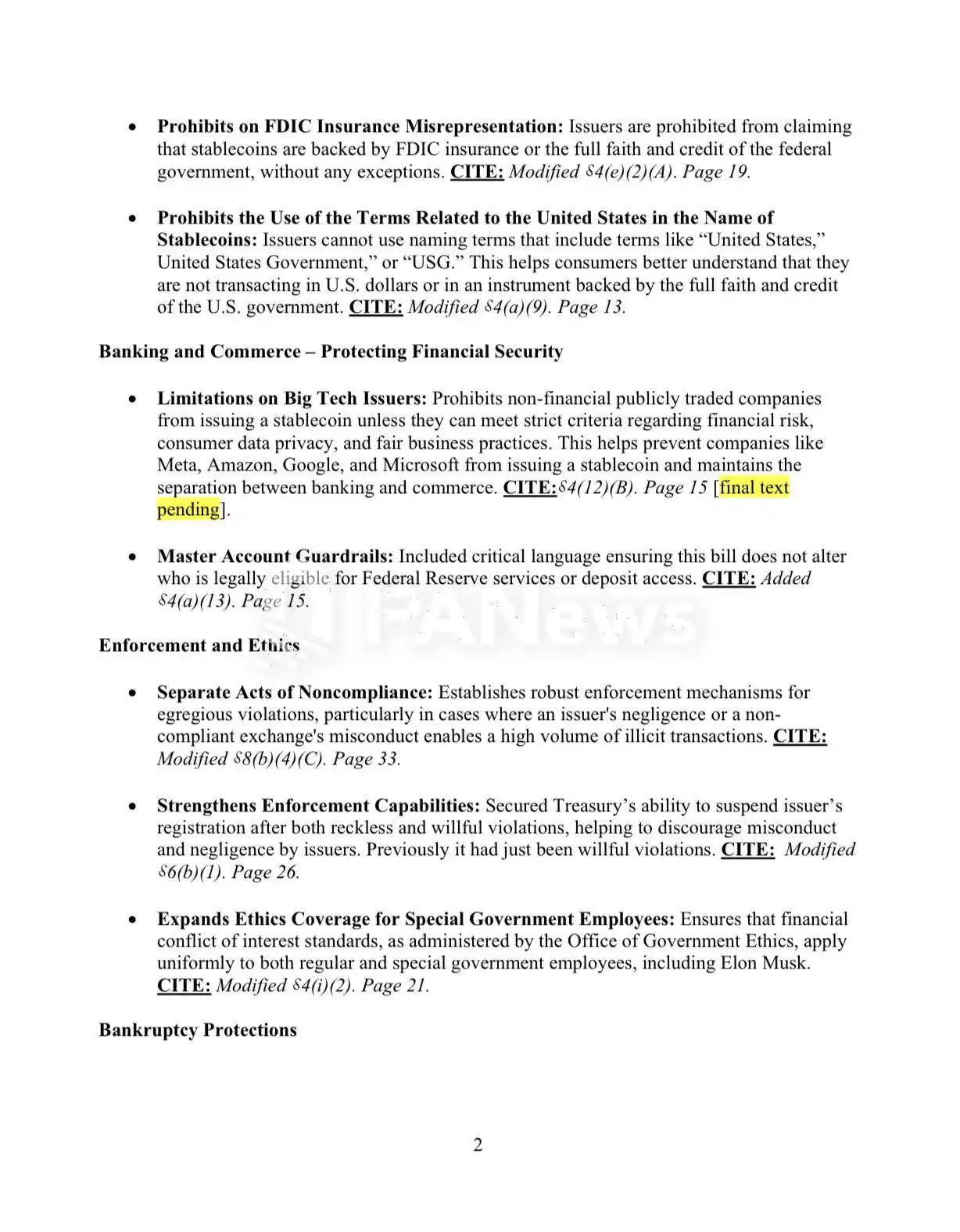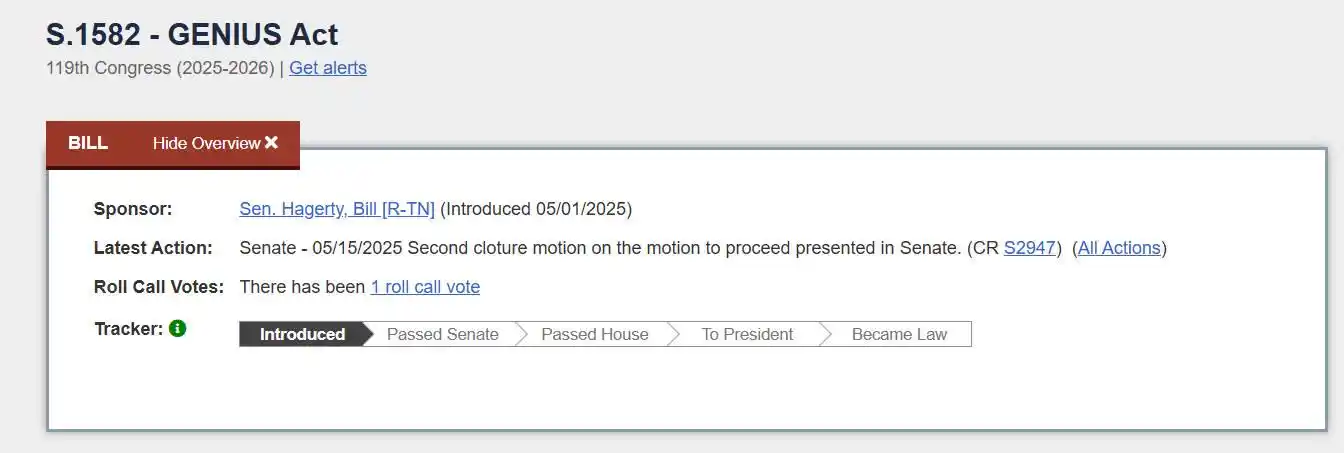Original Title: "The GENIUS Stablecoin Act Passes Senate Vote in the U.S., Still Needs Approval from the House and the President, Trump's Family Stablecoin Becomes One of the Controversies"
Original Author: PANews
On the morning of May 20, Beijing time, the U.S. Senate passed the motion to terminate debate (cloture) on the GENIUS Act stablecoin bill with a vote of 66 in favor and 32 against. Although the bill itself has not yet passed, the next step for the GENIUS Act will be to enter the full Senate debate and amendment process, but this result clears a significant hurdle for the final legislation.
Since Senator Bill Hagerty officially introduced the GENIUS Act on February 4, the text of the bill has undergone multiple revisions, adding more anti-money laundering, consumer protection, and custody provisions, while also restricting tech giants from issuing stablecoins unless they implement robust financial risk controls and strong consumer data privacy protections. The advancement of the bill also reflects the key negotiations between bipartisan lawmakers on the issue of stablecoins.
Earlier this year, U.S. President Trump publicly stated that a regulatory framework for stablecoins and market institutions is expected to be introduced before Congress adjourns in August. If this important bill is ultimately passed, it will become the first federal-level stablecoin legislation in the U.S., with far-reaching implications.
With the Senate vote passed, what key hurdles remain for the GENIUS Act to become formal law? What legislative procedures need to be completed, and what are the focal points of the lawmakers' debates? PANews has summarized the core aspects.

Continuous Amendments to the Bill: Adding More Anti-Money Laundering and Restrictions on Tech Giants
On May 8, the GENIUS Act unexpectedly failed in the Senate's cloture vote with a tally of 48 to 49, not reaching the required 60 votes. However, on the morning of May 20, the U.S. Senate voted again, passing the motion to terminate debate (cloture) on the GENIUS Act stablecoin bill with a vote of 66 in favor and 32 against.
The cloture vote aims to end debate on a particular issue, preventing lawmakers from using lengthy debates (filibusters) to delay or block a vote on the bill.
Previously, lawmakers' debates focused on several aspects, primarily the possibility of tech giants like Meta issuing their own stablecoins. Secondly, the business interests of President Trump in the crypto industry were also a point of contention. Additionally, nine Democratic senators recently stated in a joint statement that the bill still has shortcomings in areas such as anti-money laundering, national security, and accountability mechanisms.
As of May 19, by comparing publicly reported new and old versions of the U.S. stablecoin bill GENIUS Act (the latest version has not been officially released), it can be observed that the new version adds more provisions related to anti-money laundering, consumer protection, and custody. The new draft introduces an entity called the "Stablecoin Certification Review Committee," responsible for assessing whether state regulatory systems meet federal standards, replacing the related powers previously exercised by the Treasury Department, and sets conditions for foreign stablecoin issuers operating in the U.S.
Furthermore, the bill will allow tech companies like Meta to launch stablecoins in the market only after implementing robust financial risk controls, strong consumer data privacy protections, and fair business practices.
In addition to these modifications, the core content of the bill includes:
The bill defines payment stablecoins as digital assets used for payment or settlement. Such assets are pegged to a fixed currency value and are fully backed on a 1:1 basis by U.S. dollars or other approved high-quality liquid assets.
Licensing and Regulation: The bill establishes a clear application process for issuance licenses, providing guidance for institutions seeking to issue stablecoins. It introduces a "dual regulatory framework," allowing issuers to choose to register at the state or federal level. Issuers with a market capitalization exceeding $10 billion will be subject to federal regulation. Issuers with a market capitalization below $10 billion may choose to continue operating under state regulatory frameworks, provided their state regulatory standards are generally consistent with federal requirements.
Reserve Requirements: Stablecoin issuers must maintain a 1:1 reserve ratio, using high-quality liquid assets such as cash, short-term U.S. Treasury securities, or central bank deposits as reserve assets. Reserve funds must be managed separately from operating funds and must undergo monthly certification.
Transparency: Issuers must publicly disclose their reserve assets and redemption policies.
Anti-Money Laundering (AML) Compliance: The bill classifies stablecoin issuers as financial institutions under the Bank Secrecy Act, requiring them to fulfill comprehensive anti-money laundering obligations, including consumer identity verification, due diligence, and suspicious activity reporting.
Consumer Protection: In the event of issuer bankruptcy, stablecoin holders will have priority over other creditors for repayment.
Regulatory Jurisdiction Definition: The bill explicitly states that payment stablecoins are not considered securities, commodities, or investment companies under current federal law.
On May 15, according to crypto journalist Eleanor Terrett, the second page of the GENIUS Act draft proposed to prohibit stablecoin issuers from misleadingly claiming FDIC insurance or using terms associated with the U.S. government; it also prohibits non-financial tech companies like Meta and Google from issuing stablecoins unless they comply with regulatory requirements, thereby strengthening the separation between banks and businesses; the draft also enhances enforcement capabilities against violations and expands the ethical oversight of government special employees (including Elon Musk).

During the amendment process of the bill, bipartisan lawmakers also had intense debates regarding the stablecoin project of the Trump family.
Elizabeth Warren, a senior Democratic member of the Senate Banking, Housing, and Urban Affairs Committee, publicly stated that President Trump and his associates have earned hundreds of millions of dollars from his crypto business. Each year, Trump is expected to earn hundreds of millions from his USD1 stablecoin. The latest draft of the GENIUS Act circulating online does not contain any provisions to prevent Trump and his family from profiting from their allegedly corrupt cryptocurrency schemes. On the contrary, the bill will expand the stablecoin market, further boosting Trump's crypto earnings.
Ultimately, during the advancement process, according to reports on May 15, bipartisan senators reached a consensus on this issue. Democratic Senator Kirsten Gillibrand stated that the wording of the bill has been amended to remove provisions targeting Trump's cryptocurrency projects, such as meme coins. She emphasized that the revised bill has improvements in consumer protection and is not focused on Trump's ethical issues but aims to regulate the stablecoin sector.
Still Needs Approval from the House and the President
Some analysts point out that the passage of the GENIUS Act in the Senate is more time-consuming, while it is easier in the House.
Generally speaking, when a bill is introduced, it is assigned to a committee. Committee members will study, discuss, and amend the bill. The GENIUS Act, proposed by Senator Bill Hagerty, was introduced on February 4 this year and assigned to the U.S. Senate Committee on Banking, Housing, and Urban Affairs.
Subsequently, the bill will be voted on in the respective chamber. If the bill passes in one chamber of Congress, it will be sent to the other chamber for the same study, discussion, amendment, and voting process.
When both chambers vote to pass the bill, they must reconcile the differences between the two versions. Then, both chambers will conduct a final vote on the same version of the bill. If the bill is passed, it will be sent to the U.S. President.
After receiving the bill, the President will review it. The President can approve the bill and sign it into law, or refuse to approve it, which is known as a veto. If the President chooses to veto the bill, Congress can usually vote to override the veto and make the bill law. However, if the President does not sign the bill during Congress's recess, the bill will be automatically vetoed. This action is known as a pocket veto, and Congress cannot override such a veto.

From the current progress of the GENIUS Act, the passage in the Senate is relatively time-consuming due to the allowance of lengthy debates (filibusters) to block the bill from reaching a final vote. This time, the motion to end debate (cloture motion) requires a supermajority of three-fifths (60 out of 100 votes). The current Senate composition is as follows: Republicans: 53 seats, Democrats: 45 seats, Independents: 2 seats (usually voting with Democrats). This means that in this vote, even if all Republican senators vote in favor, they must gain support from Democratic senators.
Now, after the GENIUS Act's motion to terminate debate has passed in the Senate, it will enter the full Senate debate and amendment phase, and then proceed to the House.
However, the legislative process in the House only requires a simple majority (218 out of 435 votes) to pass. Currently, the House is controlled by a Republican majority (220-215), making it relatively easier for the GENIUS Act to pass in the House.
If the GENIUS Act is successfully signed into law by the President, it will have a profound impact on the stablecoin market. For example, it may drive industry consolidation, with some smaller issuers being forced out of the market due to an inability to meet reserve requirements. Increased consumer trust is expected to promote the adoption of stablecoins. Strengthened reserve audits and anti-money laundering compliance measures are likely to enhance market transparency and attract institutional investors. However, non-financial tech companies issuing stablecoins may face restrictions, as the new provisions require non-financial companies to comply with regulatory rules, potentially raising barriers for non-financial tech giants like Meta and Google to enter the stablecoin space.
However, the issue of the Trump family profiting from World Liberty Financial through USD1 remains an unresolved problem. According to the latest publicly available version, the bill does not explicitly restrict the President and his relatives from participating in crypto projects, and this loophole may become a focal point of future debates.
On May 9, U.S. Treasury Secretary Scott Bessent stated that the U.S. Senate's failure to advance the GENIUS Act is a "missed intergenerational opportunity to expand the dominance of the dollar and the influence of financial innovation." He warned that in the absence of a unified federal regulatory framework, stablecoins will develop amid fragmented state regulations, which is detrimental to the U.S. maintaining its global leadership and may push digital asset innovation overseas.
Currently, although the GENIUS Act stablecoin bill has not been formally signed into law, the success of the motion to terminate debate has paved the way for legislation. If it can successfully navigate the remaining hurdles, the bill will not only become the first federal-level regulatory framework for stablecoins in the U.S. but may also reshape the entire stablecoin market landscape.
免责声明:本文章仅代表作者个人观点,不代表本平台的立场和观点。本文章仅供信息分享,不构成对任何人的任何投资建议。用户与作者之间的任何争议,与本平台无关。如网页中刊载的文章或图片涉及侵权,请提供相关的权利证明和身份证明发送邮件到support@aicoin.com,本平台相关工作人员将会进行核查。




